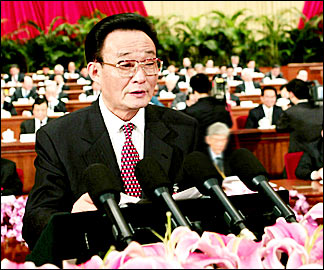
China's top legislature will deliberate on the draft law on emergency state this year as part of its legislation plan, a top legislator said Wednesday.
Wu Bangguo, chairman of the Standing Committee of the National People's Congress, told the on-going annual session in a work report of the NPC Standing Committee that the top legislature has scores of draft laws for deliberation in 2005.
It will deliberate the draft laws on emergency state, anti-monopoly, civil servants, notary, governing offenses against public order, enterprise bankruptcy, among others.
The NPC adopted amendments to China's Constitution last year. The amendments included stipulation on the state of emergency.
It will also discuss the draft amendments to laws on corporation, securities, individual income tax, audit, compulsory education, protection on women's rights and interest, according to Wu.
"The key areas of legislation will be those concerning the overall socio-economic situation and serving as a pillar in China's legal system," Wu said in his report.
The NPC Standing Committee deliberated a total of 33 pieces of laws, legal interpretations and draft decisions on legal issues last year, among which 25 were adopted.
Aside from the amendments to the Constitution that the NPC adopted last year, another important move of the top legislature was the interpretation on clauses of annexes of the Hong Kong Basic Law and decision on issues concerning methods for selecting the Hong Kong Chief Executive in 2007 and forming the Legislative Council in 2008.
"The interpretation and decision have played important role to the complete implement the guideline of "one country, two systems" and the Basic Law of the Hong Kong Special Administrative Region (SAR), earnestly safeguard the interests of various social circles in Hong Kong and Hong Kong residents in general, guarantee the gradual and healthy development of democratic system in the Hong Kong SAR in accordance with regulations in the Basic Law, and maintain and promote the long-term prosperity and stability in the Hong Kong SAR," he said.
(Xinhua News Agency March 9, 2005)
|

